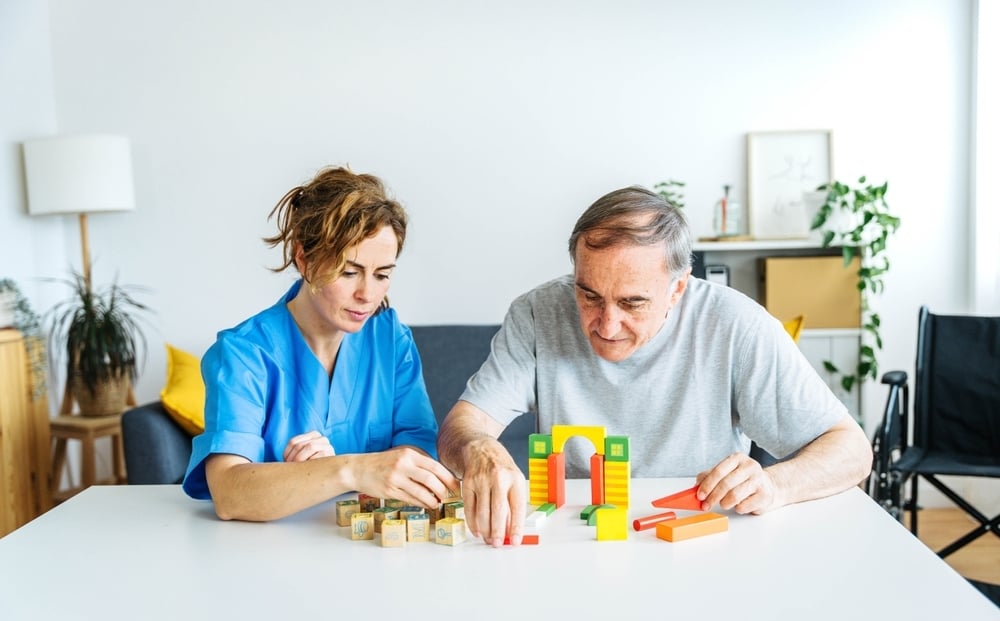Ensuring your carers have the skills and knowledge to support people living with dementia

Dementia Action Week 2025

This year, Dementia Action Week begins on May 19th to May 25th 2025; it usually takes place on the third Monday of May and is organised by Alzheimer's Society, the largest national organisation and charity that campaigns for awareness, funds research to find a cure and supports people living with dementia.
In anticipation of #DementiaActionWeek (and yes, we're starting early because this topic is very important), we discuss the critical importance of dementia awareness training in care homes. Additionally, we provide guidance and training resources aimed at enhancing dementia awareness and improving care services.
Why is dementia training important in care homes?

As the prevalence of dementia continues to rise, care staff must be equipped with the knowledge and skills necessary to provide the best possible care for individuals living with this condition. Dementia awareness training not only helps staff understand the various types of dementia and their impacts but also fosters empathy and effective communication strategies that enhance interactions with care home residents.
Additionally, it offers a variety of techniques that help care staff handle challenging situations with greater confidence and gives carers an understanding of how a person living with dementia sees the world.
Calls for the UK Government to make dementia training mandatory
The Alzheimer's Society highlights in its recent report 'Because We're Human Too' that currently, no legal requirement exists for care staff to undertake dementia training in either England, Wales or Northern Ireland, which is quite concerning. This lack of training can lead to inconsistent care, leaving both care recipients and workers without the essential resources to manage the complexities of dementia care effectively.
Care England, the leading representative body for small, medium and large providers in England, has issued a response to the recent report published by the Alzheimer's Society. This response, delivered by Professor Martin Green OBE, CEO of Care England, was featured in a recent article in Care Home Professional magazine:
-2.png?width=250&height=250&name=image%20(1)-2.png)
"People living with dementia are an important and valued part of our society, and the staff who care for them must be trained to provide the best possible care. The Alzheimer's Society's report highlights a critical gap in dementia training across the care sector, and Care England strongly supports their call for mandatory dementia training.
We know that well-trained staff improve the quality of life for people living with dementia, enhance job satisfaction, and reduce pressures on the wider health and social care systems. We need to ensure action is implemented to ensure that dementia training is a fundamental part of care staff development."
The article also goes on to say, "Currently, 60% of people receiving care at home and 70% of residents in older age residential care have dementia. Yet, alarmingly, only 29% of care staff in England receive any form of dementia training."
Angela Rippon CBE, broadcaster and Ambassador for the Alzheimer's Society, also supports the charity's call for the UK Government to make dementia training mandatory:
-1.jpg?width=206&height=200&name=image%20(1)-1.jpg)
"I was a carer for my late mum, Edna, who lived with vascular dementia.
After mum's diagnosis, I saw the difference the right care and understanding of dementia can make.
It helped to preserve Mum's dignity, made her feel loved and that she was still a valued part of our family".
Person Centred Software also supports the charity's call for the UK Government to make dementia training mandatory.
Johan Jardevall, CEO of Person Centred Software, says:
"Caring for individuals living with dementia is a complex responsibility that demands specific skills and knowledge. Without proper training, care workers may not fully understand the nuances of the condition, which can lead to inadequate care and heightened stress for both the carer and the person living with dementia.

Carers often face numerous challenges, including emotional stress, physical exhaustion, and the need for specialised knowledge about dementia care.
By offering care staff more resources, training, and access to support networks, we can help alleviate their stress and improve the quality of care for those living with dementia".
Training care staff to meet the needs of people living with dementia

Our learning and development solutions, specifically our Mandatory and Compliance Training, offer an array of awareness training around dementia, a starting point for newcomers to social care.
Our dementia awareness training is designed to equip carers with the comprehensive knowledge and practical skills necessary to support individuals living with dementia.
The training covers various types of dementia, including Alzheimer's disease, vascular dementia, and others, helping care staff understand the distinctions between them.
Additionally, we delve into the diagnostic process, offering insights into how dementia is identified and assessed by healthcare professionals. Carers will also learn about the common behavioural and psychological challenges faced by those living with dementia, such as agitation, anxiety, and difficulties with communication.
We provide practical tools and strategies to manage these issues, fostering better interactions and connections with those under your care. The training emphasises best practices in dementia care, focusing on person-centred approaches that promote dignity and respect for individuals. Importantly, we highlight the significance of encouraging independence and empowering individuals living with dementia to maintain their skills and autonomy as much as possible.
Our course aims to enhance the quality of care provided to individuals living with dementia, ensuring that carers feel informed, confident, and capable in their roles.
We also offer courses on:
Dementia Awareness Training
Enhance your care team's understanding of dementia and ensure high-quality care across your care home with our Mandatory and Compliance Training.






.jpg)

.webp?width=80&height=80&name=HTD%20Awards%202023%20Badge%20(4).webp)














